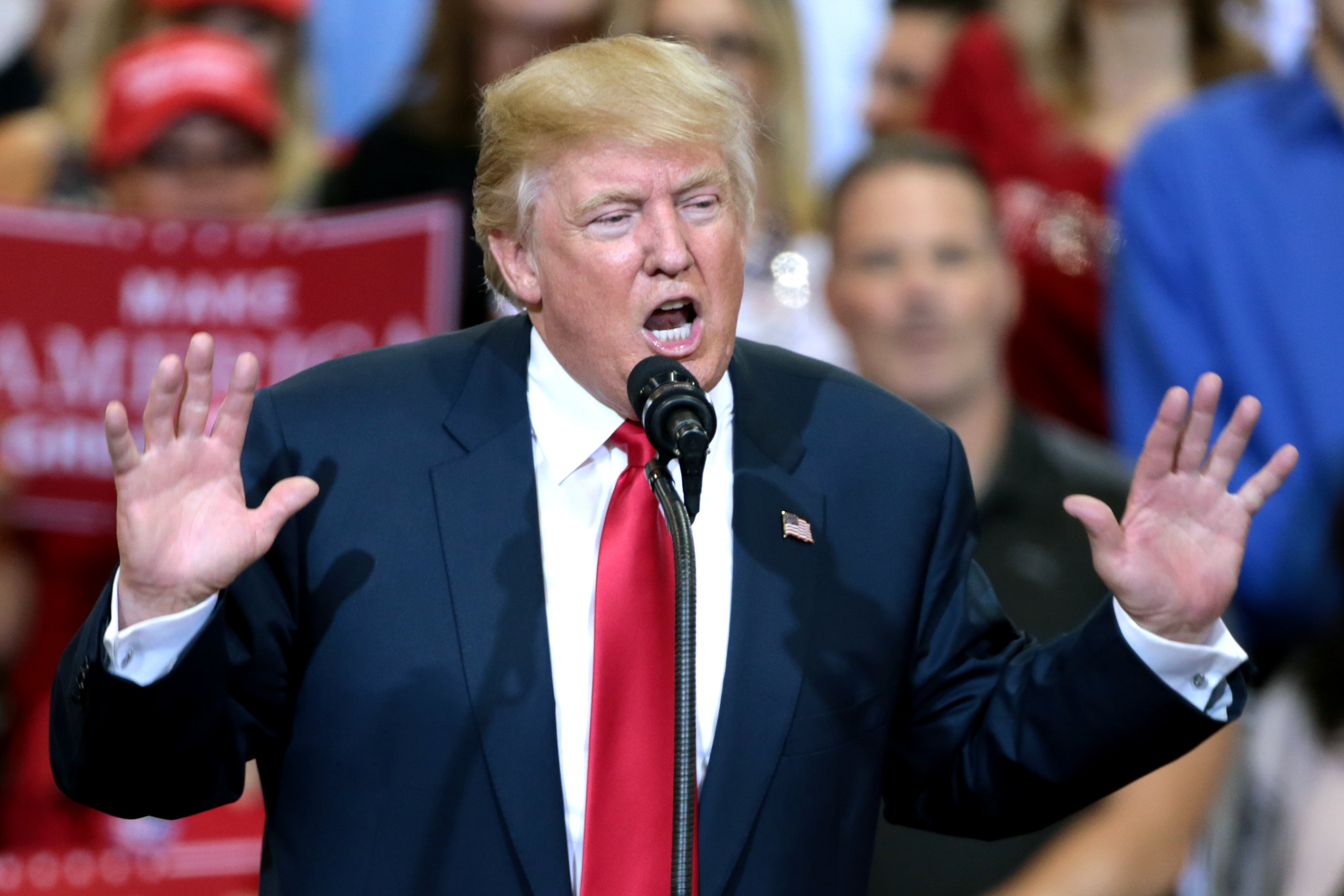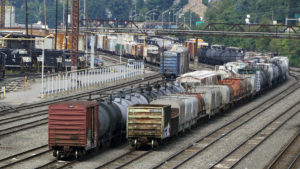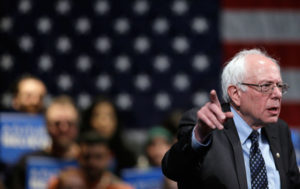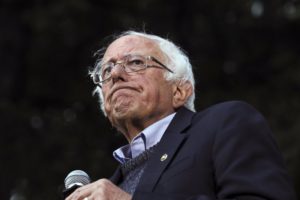Trump’s NAFTA 2.0 Is Fatally Flawed
Author and editor Nicole Aschoff explains how the bipartisan U.S.-Mexico-Canada Agreement favors corporate interests over working people. President Donald Trump. (Gage Skidmore / Flickr)
President Donald Trump. (Gage Skidmore / Flickr)
What follows is a conversation between author Nicole Aschoff and Greg Wilpert of The Real News Network. Read a transcript of their conversation below or watch the video at the bottom of the post.
GREG WILPERT: Welcome to The Real News Network. I’m Greg Wilpert in Arlington, Virginia.
In the same week that impeachment articles were turned over for trial in the Senate, President Trump was able to celebrate two successes in the area of trade. First, on Wednesday, he signed a phase one trade deal with China, and then on Thursday the Senate overwhelmingly passed the U.S.-Mexico-Canada agreement, also known as the USMCA, or NAFTA 2.0. The USMCA passed with nearly bipartisan support in a vote of 89 to 10. The USMCA is a revision of a treaty that had first been presented last year and met substantial opposition back then.
Many Democrats and the AFL-CIO agreed to support this new version of the agreement because they said labor issues that had previously been left out of it are now in this new version. However, some Democrats continued to oppose it, such as Senator Kamala Harris of California, Bernie Sanders of Vermont, and Chuck Schumer of New York. They all said that one of the main problems is that the new deal does not take climate change into account. The key changes in the USMCA relative to the original NAFTA agreement that was passed in 1994, is that it eliminates the Investor-State Dispute Settlement provision, which greatly favored corporations, and it also increases the requirement of North American content for cars and parts from 62.5% to 75%. Also it includes tougher standards for protecting labor rights in Mexico.
Joining me now to discuss the USMCA is Nicole Aschoff. She’s a sociologist, writer and editor at Jacobin magazine, where she has written on trade issues. Her most recent book is The Smartphone Society: Technology, Power and Resistance in the New Gilded Age, which will be out in March with Beacon Press. Thanks for joining us again, Nicole.
NICOLE ASCHOFF: Thanks for having me.
GREG WILPERT: So just as we did in a segment with you on the U.S.-China trade deal, let’s start with who wins and loses in this USMCA deal. What would you say? Who wins and loses here?
NICOLE ASCHOFF: Well, experts said that NAFTA 2.0 or the USMCA is 90% of the original NAFTA agreement. And that agreement was designed to benefit corporations. And I think we can say the same with this agreement as primarily going to benefit elites and giant corporations and is not going to help ordinary working people a whole lot.
GREG WILPERT: But what about these provisions that I mentioned in the introduction? For example, the requirement for a greater proportion of North American components increasing it from 62.5% to 75%? And the elimination of the Investor-State Dispute Settlement provision? Wouldn’t those benefit to an ordinary people?
NICOLE ASCHOFF: Well, let’s talk about the Investor-State Dispute Settlement first. I think this is a genuinely positive development with the new agreement. So we can say that this is a good thing, particularly when it comes to a state’s ability to enact environmental regulations and to limit the behavior of corporations and the ability of corporations to basically do whatever they want in terms of investment in production. This is a positive thing. So this is a good thing. Now, how this is going to impact ordinary people moving forward, well this’ll depend on how social movements and grassroots environmental movements are able to organize and use it as a tool to rein in corporations.
Now, regarding the U.S. auto industry and the North American auto industry more broadly, this is a bit trickier and I think we’re not going to see the huge gains in terms of job numbers that are being touted certainly by the AFL-CIO. And one of the reasons why, is that if you look at the production footprint of the North American auto industry and how it’s evolved over the past few decades, it’s become very spread out and extremely integrated between Canada, the United States and Mexico. And while it’s certainly positive that the content requirements have been raised to 75%, this isn’t going to really result in dramatic shifts in terms of where parts are being produced, where cars are being assembled, and in particular, how many jobs are going to be created in the United States.
There was some talk about having domestic content requirements specific to the United States, which would have resulted in more auto jobs in the U.S., But that didn’t get passed. So the kinds of changes that auto companies are going to need to meet these new requirements are actually surprisingly minimal. And so I don’t think we’re going to see a huge increase in the number of jobs that are going to be created, particularly auto jobs in the United States, as a result of the USMCA.
GREG WILPERT: It’s interesting how this USMCA was able to pass almost with bipartisan support. Now there were only a handful of Democratic senators, 10 of them I believe, who voted against it. And as I mentioned earlier, they included Sanders, Harris and Schumer among others. Now, we’ve got a clip here from the most recent Democratic debate which highlighted the disagreement between Bernie Sanders and Elizabeth Warren on this issue.
BERNIE SANDERS: This deal, and I think the proponents of it acknowledge, will result in the continuation of the loss of hundreds of thousands of good paying jobs as a result of outsourcing. NAFTA, PNTR with China, other trade agreements, were written for one reason alone, and that is to increase the profits of large multinational corporations.
ELIZABETH WARREN: I led the fight against the trade deal with Asia and the trade deal with Europe because they didn’t think it was in the interest of the American people. This new trade deal is a modest improvement. Senator Sanders himself has said so. It will give some relief to our farmers. It will give some relief to our workers. I believe we accept that relief. We try to help the people who need help. And we get up the next day and fight for a better trade deal.
GREG WILPERT: I should note that other candidates on the debate stage also favor to vote in favor of the new USMCA. And Bernie Sanders was the only one who actually opposed it. Now, what do you make of their respective arguments with regard to the USMCA? Is it an improvement over NAFTA, and wouldn’t that actually justify a vote in its favor?
NICOLE ASCHOFF: I think it depends on how you view moving forward, and what kind of changes need to be put in place. I think that Sanders has the right position here, which is that if we make slight tweaks to the agreement, and we put it back and we put it in place, it just maintains this status quo of trade relationships in North America, and really blocks the moment him to make the big changes that we need to actually both create good jobs for working people and to address this looming climate crisis. If you make these small changes and say, “Well, this is good enough for now.” In reality, what you’re saying is, “This is the framework that we’re going to be operating for the future,” right?
We’re going to have to revisit the agreement in six years. But in reality, companies are breathing a huge sigh of relief and saying this is the deal that’s going to be in place. Because it’s so much work to actually create something different, right? And to actually gain the momentum to build a different kind of trade agreement. So I think Sanders is right here and that we have to take this opportunity, right? Where we’re actually talking about global inequality. We’re actually talking about the need to reconsider trade as a key issue, and to link it to climate change and build something radically different. Rather than just make small tweaks to the status quo.
GREG WILPERT: So following up on that, what would a more radically different North American trade treaty look like?
NICOLE ASCHOFF: Well, it would have to be designed thinking about the needs, not just of American workers, but also Canadian workers and Mexican workers. One of the defining features of NAFTA is that it was used by corporations to threaten workers in all three countries, to agree to concessions and to threaten them that they’re going to lose their job, that production will be moved to another place if they try to organize a union. And that hasn’t changed at all.
We really need to take away that threat, right? To not allow corporations to move production wherever they want, whenever it suits them. Because there are a lot of people who are impacted by production. It’s not just the shareholders who we have to be thinking of. It’s the stakeholders. And this is the same with the USMCA, companies can pick up and move wherever they want, no matter the impact that it has on the communities that they’re operating in.
So if we want to start talking about trade, we need to think about it in terms of what would it worker-centered trade look like, right? Which is something very different from giving companies these modest restrictions. But really allowing them total flexibility in organizing production and jobs in the way that they want. So if we want to move forward, both in terms of creating good jobs for people, and also doing something about the global climate crisis, we have to actually be willing to restrict the freedoms of corporations in favor of the freedoms of communities and working people.
GREG WILPERT: Okay, well we’re going to leave it there for now. In another segment with Nicole, we take a closer look at the U.S.-China trade deal. I was speaking to Nicole Aschoff, writer and editor at Jacobin magazine. Thanks again, Nicole for having joined us today.
NICOLE ASCHOFF: Thanks for having me.
GREG WILPERT: And thank you for joining The Real News Network.
Your support matters…
Independent journalism is under threat and overshadowed by heavily funded mainstream media.
You can help level the playing field. Become a member.
Your tax-deductible contribution keeps us digging beneath the headlines to give you thought-provoking, investigative reporting and analysis that unearths what's really happening- without compromise.
Give today to support our courageous, independent journalists.






You need to be a supporter to comment.
There are currently no responses to this article.
Be the first to respond.